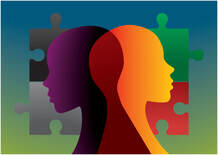Module BC05 - 10 Weeks
Whole-Person Ministry
Course Description

Why did God create humankind? When God created humankind, what did He create? What is the Fall and how has it affected us? What about the soul? What is it and when do we get it? What about sin? What are the real and ongoing effects of the sin of our original "parents," Adam and Eve? Do we have a free will? Is there such a thing? Men and women: what is the big difference? What are the material and immaterial aspects of our makeup? How do they affect each other and what bearing does this have on biblical counseling? Hard questions that affect the way we view and relate to one another.
This course is a study of the nature of humanity and the effects of sin as well as the “theology of food.” We will look at the nature of humanity from a Biblical perspective by examining the pre-fall and post-fall states of man. We will see how these issues were dealt with from a historical perspective by spending time on the debate between St. Augustine and Pelagius and how aspects of that debate are ongoing today. Attempt will be made to understand the implications and inferences of man being created in the image of God. Discussions will take place about the origination of the human soul and about the origin, nature, and effect of sin. We will cover the importance of nutrition, health, illness, disease, rest, movement, and other important factors to consider when providing soul-care to others.
Course Outline
The Why of Man
Session 1
Session 2
Session Five
Session 7
Session 8
Course Objectives
"May our Lord Jesus Christ Himself and God our Father, who loved us and by His grace gave us eternal comfort and good hope, encourage your hearts and strengthen you in every good work and word." 2 Thessalonians 2:16-17
This course is a study of the nature of humanity and the effects of sin as well as the “theology of food.” We will look at the nature of humanity from a Biblical perspective by examining the pre-fall and post-fall states of man. We will see how these issues were dealt with from a historical perspective by spending time on the debate between St. Augustine and Pelagius and how aspects of that debate are ongoing today. Attempt will be made to understand the implications and inferences of man being created in the image of God. Discussions will take place about the origination of the human soul and about the origin, nature, and effect of sin. We will cover the importance of nutrition, health, illness, disease, rest, movement, and other important factors to consider when providing soul-care to others.
Course Outline
The Why of Man
Session 1
- Why Did God Create Man?
Session 2
- Constitution of Man: Monism
- Constitution of Man: Dualism
- Creation of the Soul
- The Imago Dei in Man
Session Five
- Original Sin: Pelagianism vs. Augustinianism
- Original Sin: Augustinianism vs. Arminianism
- Free Will
Session 7
- Egalitarianism
- Complementarianism
Session 8
- Application of Health & Nutrition
- Understanding the Effects of Medications
- Ministering to the “Whole Person”
Course Objectives
- To help the student develop a Biblical anthropology and understand the consequences of one’s answer to the question, “Why did God create man?”
- To help the students understand what the church has historically believed about the nature and purpose of mankind.
- To equip the student to gain knowledge of the different theories concerning the human constitution.
- To equip the student with a greater understanding of what it means to be created in the image of God and how that should affect one’s counseling philosophy.
- The student will learn what affect the Fall (the Rebellion) had on the mind of man as well as his moral, social, and volitional abilities.
- To equip the student to understand and speak in an informed manner regarding mankind’s free will and culpability for sin.
- To introduce the student to the much-neglected realm of nutrition and other health matters that impact the physicality of human beings and the ramifications of physical health on the mental, emotional, and spiritual aspects of being human.
- To help the student gain an appreciation of human dignity by learning that, while man is not what he was supposed to be, yet he still retains great dignity by reflecting the glory of God.
- To help the students be equipped to have more intelligent and biblical conversations about humanity, sexuality, euthanasia, abortion, and other related matters to help bring biblical understanding of these matters to others.
"May our Lord Jesus Christ Himself and God our Father, who loved us and by His grace gave us eternal comfort and good hope, encourage your hearts and strengthen you in every good work and word." 2 Thessalonians 2:16-17